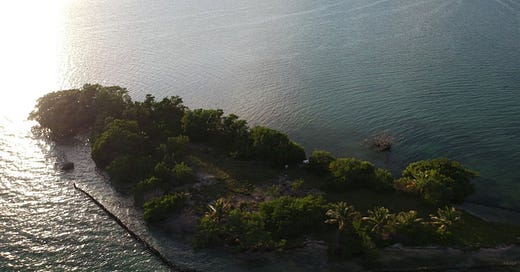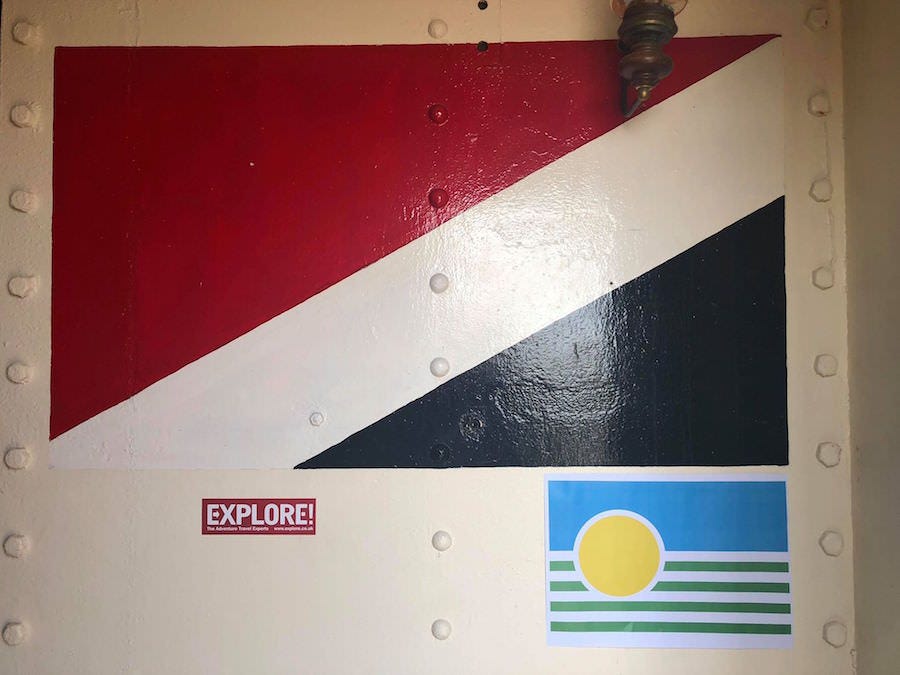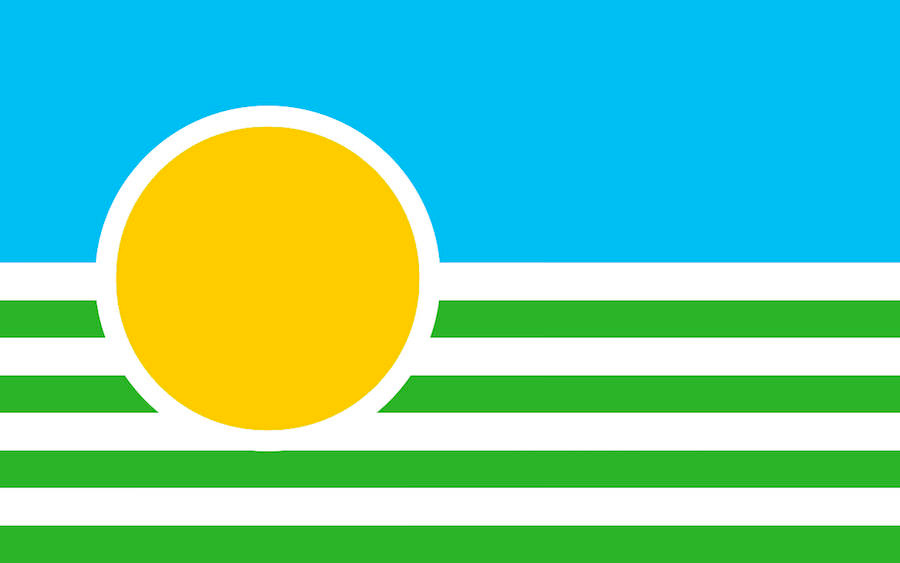In 2018 I joined a project aimed at creating an experimental micronation.
Our micronation – the Principality of Islandia – now has hundreds of citizens, and its home on Coffee Caye, an island off Belize, is the world’s first crowdfunded private island.
Here’s a brief account of how that happened.
The Pitch
In May 2014, I was sat on the garden patio at Hotel Nacional de Cuba, in Havana, sipping a cold daiquiri while the jazz band played behind us, and listening to Gareth Johnson (the director of Young Pioneer Tours) outline his plan to one day buy a private island and declare his own independent micronation in the sea.
A micronation is a small entity, usually attached to a specific plot of land, which declares itself to be an independent sovereign state. Often they are formed as venues for artistic expression, or as political or ideological experiments. Well-known examples include Freetown Christiania, the semi-autonomous zone within Copenhagen, Denmark; or the Republic of Užupis, a neighbourhood in Vilnius, Lithuania, which flies its own flag, uses its own independent currency, and displays its unique constitution painted on a wall as you enter. Both of these examples are tolerated by their respective ‘host’ governments, not least since they have become popular tourist destinations and so arguably bring money into these cities.
Other times though, micronations are formed as anti-government protests. North Dumpling Island in New York State declared independence from the US in 1986, when its owner was denied permission to build a wind turbine. The Murrawarri Republic symbolically seceded from Australia in 2013, in respect of its history as the traditional homeland of a local aboriginal nation. Also in Australia, the Gay and Lesbian Kingdom of the Coral Sea Islands was declared in 2004 as a political protest, and then dissolved in 2017 once Australia legalised same-sex marriage.
Occasionally, micronations are used to facilitate actions deemed as illegal by their host countries – for example the Dominion of Melchizedek, which was involved in large scale banking fraud in the 1990s. Or more famously, the Principality of Sealand: a self-declared entity on a former WWII sea fort in the North Sea off the coast of Suffolk, England, which was declared in 1967 initially for the purpose of broadcasting pirate radio.
The most recent micronation to make the news (before ours, that is) was the Free Republic of Liberland, established by the Czech political activist Vít Jedlička, on a technically unclaimed island in the Danube River between the borders of Croatia and Serbia.
After that conversation in Havana, the next time I heard Gareth talking about his micronation idea was in 2018. By then, he had developed a plan for crowdfunding the purchase of a private island, and he had already recruited a couple of dozen people who wanted to be a part of it.
Curious to see how this experiment in democracy would pan out, I decided to join them for the ride.
The Project
Things started to move quite quickly after that.
Gareth co-founded a new company – Island Buying Group Inc. – in the Caiman Islands, with New Yorker Marshall Mayer, who had previously worked in global finance and had founded a disaster relief agency in the Philippines. The plan was to find investors willing to contribute a share towards the purchase of a parcel of land, ideally an island, where we would then symbolically declare our independence.
Like Christiania and Užupis, this project was to be a peaceful and largely non-political exercise in hypothetical statehood – which abided by the laws of the country it was in, and perhaps even served to help boost local tourism. The nation aspect of the project was to be more a state of mind than a literal territory (none of us was looking to actually fight a war for independence). Then the island would be a place in which to experience that state of mind.
Being founded by a collective of largely like-minded travellers and travel industry insiders, it would reflect our shared values of self-determination, eco-sustainability, and democratic equality amongst its citizens.
It was also important that this should be somewhere that other travellers would want to visit. Whereas Liberland was established on a marshy little river island in the Danube, we dreamed of toasting our ‘independence’ on a tropical beach.
As the group grew, we began to discuss exactly what our micronation would look like. We eventually settled on the name ‘Islandia’ (not the best name, in my opinion – but that’s democracy for you), declaring ourselves a principality on 3 July 2018. Prince Marshall became our first head of state, and we held an election which was won by Prime Minister Jodie Hill. She in turn appointed a small government.
Initially, I served as Minister of Information, and when we held a competition to design a flag it was my design that was selected. At that stage though, our micronation was still a largely theoretical entity – its physical address was just a spare room in one member’s house. But as we attracted more investors, the idea of moving to our own plot of land became increasingly realistic.
For the next year, our 50+ citizens would debate over private island listings in our online forum. By the time we had each thrown a few thousand dollars into the pot, we found we had some interesting options open to us.
We looked at islands for sale in Central America, in Malaysia, and the Philippines; there was one empty island near Estonia, and another windswept plot just off the coast of Ireland. We had to consider not only the price, but also the desirability of spending time there and the potential for building... in addition to the political stability of the region (we didn’t want to make a deal with one government, only to have it reversed when the next came in).
After much discussion (and a couple of field trips by members of the group) we eventually settled on an uninhabited island called Coffee Caye, in Belize, which we purchased on 18 December 2019 as a home for our project.
The Present
Today the Principality of Islandia has over 600 citizens, with just under a quarter of those also contributing as shareholders in the island-buying project. It is still welcoming new shareholders – through the Let’s Buy an Island website – while also following the model established by Sealand and others by selling citizenship, ID cards, and even noble titles.
All this money goes back into a fund for the development of the island itself.
Coffee Caye came with planning permission, and with the remaining funds we intend to develop permanent structures for tide and erosion control, as well as a series of guest houses and facilities for eco-friendly, self-sustainable living. The intention is to eventually open the island for tourism and private events, to build some kind of community there, and maybe in time even deliver shareholders a return on their investment.
I was planning to visit the island in 2020. Obviously coronavirus threw a spanner in the works though, and it slowed down a lot of other progress on the project too. But we did succeed in our first goal, with Coffee Caye becoming the world’s first successfully crowdfunded private island purchase. Our next big target is to reach 5,000 citizens.
So yeah, I co-own an island in the Caribbean now. One of these days I’m going to sail over and have a look – maybe camp out for a week or two with a hammock, a typewriter and a case of rum.
There is already more I could tell you about the project so far. It’s been an interesting social experiment, to say the least: throwing a few hundred total strangers together and making them vote on what paradise should look like. I will have more to say about it in future, no doubt… and especially once I get to Coffee Caye.
I have a feeling that this current essay might some day end up serving as the introduction to a much longer story.
Islandia in the Press:
Irish Central, August 2020 – Cork Island on the Market Fails to Become First Island Bought by Crowdfunding
Reisijuht, July 2020 – How to Create Your Very Own Country? You Don't Have to be Rich, You Just Have to be Brave [in Estonian]
Lonely Planet, August 2019 – You Can Own Part of the World’s First Crowdfunded Private Island







What an amazing project, the stuff of which dreams are made